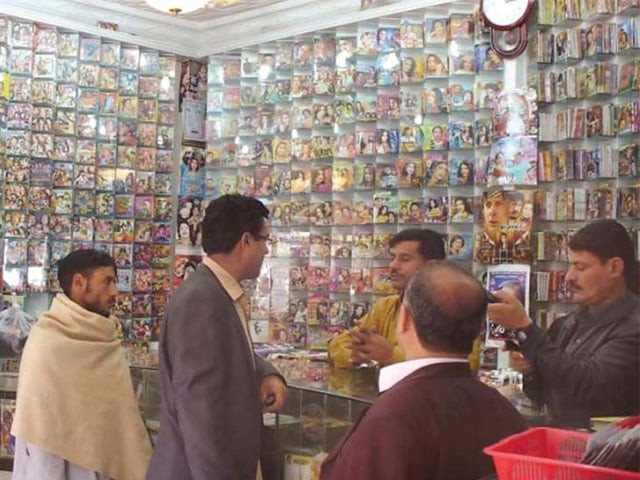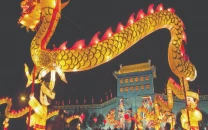Sound survival: If music be the food of love, play on
Responding to ultra-conservatism, Pashto dramas and pop music CDs spread across K-P and achieve niche status.

During this time, CDs with violent movies and music albums became the only alternative, the tacit reply of the culturally deprived to the moral police. Notably, these dramas also altered some literary trends. Now, duets and pop music are spreading across the Pashto music scene, according to song writers, while in the past ghazals were the ‘sin’ of choice for most people.
Ziaurrehman Zia, a poet and author of several popular songs says that it was a volte-face for him to start writing songs.
“I was basically a ghazal poet and had been trying to do that for around 20 years, but around two years back I realized that it is now time to write pop songs,” Zia told the Express Tribune.
He said almost all the big names of the Pashto music scene including Shahinshah Bacha, Zarshad, Musaraat Momand, Samia Naz, Zaman Zahir and Shad Khan have performed his lyrics.
For Zia, the new experience has been a good one. Most recently, the Asma Lata song,”Da Stargi Jadugari De, Da Meena Lewanye Da” (the magic of your gaze has cast its spell) which was penned by him, has been quite a sensation over the past month.
The song has also been recorded as a duet now with new singer Hakim Khan and Asma. Interestingly, Asma herself is not a Pakhtun and belongs
to Punjab.
Talking to The Express Tribune, Zia said, “CD dramas and albums now reach at least 85 per cent of Pakhtun households.”
He suggested that the new trend was inspired by the enforced closure of Nishtar Hall, as recording performances were the only way for the recently unemployed artists to keep themselves off the street.
The popularity of CDs may be undeniable, but the criticism of the glorified portrayal of violence and accusations of vulgar dances in the content are not without merit.
“CD dramas will never reach the quality of films as million of rupees are invested in films, while CD albums are produced for barely Rs200,000,” Zia said.
However, he says change is inevitable, cautioning that it be a positive with decency injected into dialogue, wardrobe and scene direction.
The low cost of CD dramas has made them an affordable, often first-choice form of entertainment, especially when compared to spending Rs1,000 for a single viewing at a cinema in Peshawar, something very few can afford anyway, he said.
On the flip side, he agreed that these dramas have had a role in spreading vulgarity. The lifestyles, singing and dancing that these dramas portray were foreign to Pakhtun culture, and their reach within every Pakhtun household had begun to ingrain the same culture
in some.
“Initially the only place to watch these shows was outside the confines of one’s home, but now it is the opposite,” he said.
Rais Khan Sehrai is another renowned Pashto lyricist. A WAPDA employee, Sehrai has been writing songs for the past two decades. “CDs have changed the market and public taste,” Sehrai said.
He agreed that they have also changed the style of music. Pop-style music is more popular with the public and has also provided more opportunities to budding artists, something unimaginable in the era of films and television when only a few big names held sway over the scene. At least 83 of Sehrai’s songs have been sung by the biggest names in Pashto music over the past few years. “There is not a Pashto singer around who has not performed my songs!” Sehrai told the Express Tribune.
Sehrai said that he did not charge for his lyrics, but many other lyricists whose only trade is music face problems, as it is the singers who gain fame and fortune off the sweat and blood of these artists.
Today, lyricists even have to pay singers and album directors to make them sing their songs and all the credit goes to the singers and composers, with the lyricist getting nothing out of the transaction, Zia said.
Sehrai said that Peshawar, the production base for most of the CD dramas, is also their largest market.
The German philosopher Friedrich Nietzsche wrote that without music, life would be a mistake. The last few years prove his point, music thrives in forms new and old, showing that even the most concentrated efforts of the extremists were in vain.
Published in The Express Tribune, January 19th, 2011.



















COMMENTS
Comments are moderated and generally will be posted if they are on-topic and not abusive.
For more information, please see our Comments FAQ